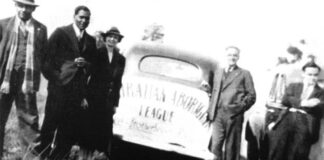The death in custody of 18-year-old Aboriginal man Sheldon Currie has exposed the criminal neglect of Aboriginal prisoners in Australia. Currie’s death was the fourth in six weeks in Queensland’s prisons.
Currie was held at the Arthur Gorrie Correctional Centre in Brisbane for six weeks, facing minor charges. Despite a pre-existing medical condition that required ongoing treatment, Currie was repeatedly denied medical assistance by prison authorities. After five weeks he was unable to walk and was assisted by other Murri inmates, who also demanded treatment.
It was not until Currie was found unconscious in his cell that he was taken to hospital and put on life support. His family were denied visitation rights until his death four days later.
At a rally outside Queensland’s parliament, one grieving protester said: “This death, like so many others, could not have happened had the police and government implemented the full recommendations of the 1991 Black Deaths in Custody report.”
Since the 1991 Royal Commission into Aboriginal Deaths in Custody there have been over 200 recorded deaths. Murri leader, Sam Watson, told the Brisbane rally that Currie’s death shows recommendations made by the Royal Commission have never been implemented. He called for a national audit. A key recommendation in the report—that prison be used as a last resort—continues to be ignored. Incarceration rates for Aboriginal adults are 13 times that of the non-Aboriginal population.
The tragedy of Sheldon Currie is, sadly, one among many. A spate of recent suicides in remote NT Aboriginal communities have been linked to the racist Intervention. Young Aboriginal men are jailed at six times the rate of young black men in Apartheid South Africa.
The death of respected WA Aboriginal elder Mr Ward in January last year sparked outrage. Mr Ward died of heat exhaustion after being transported 700 kilometres in the back of a prison van in temperatures over 47 degrees. Large protests demanded justice and transparency in the investigation. Despite coronial findings of criminal negligence, the WA state government has extended the contract of the private prison transport company, GSR, that transported Mr Ward. Refugees transported interstate by GSR were forced to drink their own urine when GSR didn’t provide them with water.
Mulrinji inquest
In the week of Currie’s death, Queensland police office Chris Hurley was back in court. He was attempting to have findings that he was responsible for the death of Palm Island man Mulrinji Doomadgee struck from official records. Hurley was the second police office in Australian history to be charged with manslaughter over an Aboriginal death in custody. But despite the coroner’s finding that Hurley’s brutal beating of Mulrinji in the watch house caused his death—and Hurley’s own admission that he “must have been responsible”—he was acquitted in 2007. He still serves as a police officer.
The latest inquest revealed that the Queensland Police Union helped ensure Hurley was never brought to justice. Police witnesses admitted they colluded on statements given, and were instructed by the Police Union to withhold their statements until the Commissioner demanded them. Officers admitted they refused to cooperate with the prosecution team “because the accused was a fellow police officer”. An internal report on this corrupt police investigation into Mulrinji’s death is still unavailable to the public, six years on.
“Law and order” campaigns are no solution for Aboriginal communities. True justice will need to be fought for.
By Lauren Mellor





